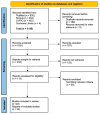Safety, Immunogenicity, and Efficacy of COVID-19 Vaccines in Radiation-Oncology Patients: A Systematic Review and Meta-Analysis
- PMID: 40733692
- PMCID: PMC12298249
- DOI: 10.3390/vaccines13070715
Safety, Immunogenicity, and Efficacy of COVID-19 Vaccines in Radiation-Oncology Patients: A Systematic Review and Meta-Analysis
Abstract
Background/Objectives: The COVID-19 pandemic significantly threatened cancer patients and oncologic care. The rollout of vaccines emerged as a critical milestone, despite the initial lack of evidence regarding their safety and efficacy in this population. This systematic review and meta-analysis evaluate the current evidence on COVID-19 vaccination in patients undergoing radiotherapy (RT). Methods: PubMed, Livivo, Scopus, and Cochrane Library were systematically reviewed for relevant publications on COVID-19 vaccination in the context of radiation oncology, published by 19 April 2024. The treatment effects were calculated as the proportion of seroconverted individuals. Results: A total of 22 studies published between 2021 and 2024 were included, covering various aspects of vaccination, including safety, tolerability, qualitative and quantitative humoral responses, cellular responses, vaccination efficacy, and booster vaccinations. Notably, patients undergoing RT exhibited a high willingness to receive vaccination. Vaccination was overall well tolerated and safe, with a low incidence of side effects, which were primarily mild. The primary meta-analysis showed a seroconversion proportion of 91% [95% CI: 84-96%] overall, with a somewhat higher proportion of 93% in patients receiving RT alone, compared to 90% in patients receiving either RT or RT combined with chemotherapy. Furthermore, immunization during RT led to a sustained increase in antibody titers, with a notable long-term persistence of IgG. Conclusions: COVID-19 vaccines demonstrate excellent safety, immunogenicity, and efficacy in patients receiving RT, who also exhibit a high willingness to be vaccinated. The outcomes observed are comparable to those in healthy controls and superior to those seen in patients receiving other cancer treatments, such as chemotherapy. The vaccination of radiation oncology patients in future pandemics or epidemics is strongly advocated even during active treatment.
Keywords: SARS-CoV-2; booster vaccination; cancer; cellular response; humoral response; immunization; vaccination.
Conflict of interest statement
All authors declare to have nothing to disclose.
Figures









References
-
- Spencer K., Jones C.M., Girdler R., Roe C., Sharpe M., Lawton S., Miller L., Lewis P., Evans M., Sebag-Montefiore D., et al. The impact of the COVID-19 pandemic on radiotherapy services in England, UK: A population-based study. Lancet Oncol. 2021;22:309–320. doi: 10.1016/S1470-2045(20)30743-9. - DOI - PMC - PubMed
Publication types
LinkOut - more resources
Full Text Sources
Miscellaneous

